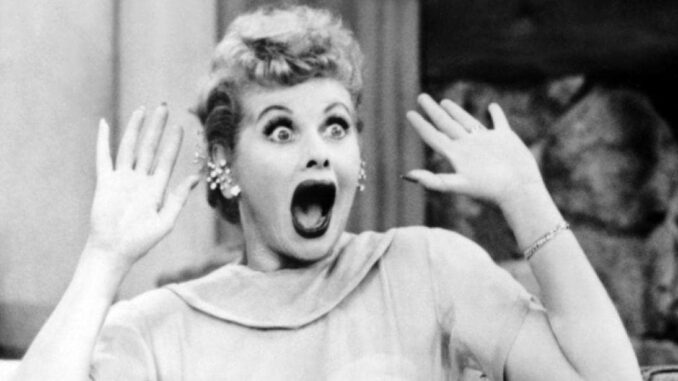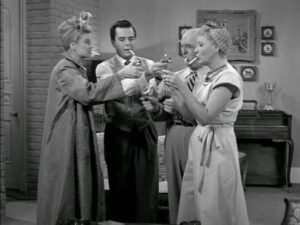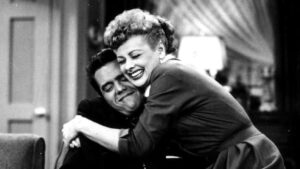
The Network Didn’t Think Lucy’s Marriage To A ‘Foreigner’ Would Ever Work On Television
Desi Arnaz was a popular musician, but faced difficulties establishing a career in acting because of his Cuban accent and “ethnic identity.” Conversely, Lucille Ball rose to success with My Favorite Husband, a radio program from the late 1940s. It became a TV sitcom in 1953.
Ball didn’t star in the television version, but CBS offered her a sitcom. She said she would only take the job if her real-life husband could play her on-screen husband. The studio didn’t like the idea – they thought Desi’s accent was too thick and his Cuban heritage would prove off-putting to ’50s viewers.
Ball and Arnaz decided to prove the studio wrong. They formed a club act together in 1950 and toured the country to wildly positive reviews. They impressed CBS, which greenlit a show starring the couple.
The Grape Stomping Scene Almost Cost Lucille Ball Her Life

In one of the most famous episodes of I Love Lucy, “Lucy’s Italian Movie,” Lucy gets into a vat of grapes and stomps them with local Italian women. The scene was entirely unscripted, according to producer Jess Oppenheimer.
During filming, Lucille Ball began to fight with one of the women, opera singer Teresa Tirelli D’Amico. Ball claimed D’Amico almost drowned her during the scene when she got grapes up her nose while shooting.
Vivian Vance Reportedly Couldn’t Stand William Frawley
Tension reportedly grew quickly between William Frawley, who played Fred Mertz, and Vivian Vance, who played his on-screen wife, Ethel Mertz. On the show, the Mertzes regularly made fun of each other, and the unkind words between Vance and Frawley escalated.
Vance allegedly called Frawley an “old poop,” while Frawley supposedly described her as an “old fat-ass” and a “b*tch.” There was a rumor about the Mertzes starring in their own spinoff show after I Love Lucy ended, but according to some sources, Vance quickly put an end to the prospect, since she refused to work with Frawley any longer.
By some accounts, though, the media may have overstated their disdain for each other. The two may have had a love-hate relationship.
Lucille Ball’s Pregnancy Sent Broadcasting Executives Into A Panic
When Lucille Ball discovered she was pregnant at the end of the first season of I Love Lucy, it appeared the show would have to end. Pregnancy was an off-limits subject at the time, but producer Jess Oppenheimer saw it as an opportunity. Oppenheimer decided to essentially sell Ball’s pregnancy to the network, though the Ricardos slept in separate twin beds, and no one could say the word “pregnant” on air.
CBS and the major sponsor of the show, Philip Morris, didn’t like the idea of including Ball’s pregnancy in the show, but ultimately agreed. They called for a priest, minister, and rabbi to oversee the scriptwriting process for the big reveal episode. They titled it “Lucy is Enceinte” – enceinte is French for “pregnant” – and aired it on December 8, 1952.
The Show Prominently Featured Cigarettes For Advertising Revenue

I Love Lucy experienced difficulty getting advertisers. Until they reached a deal with Philip Morris, finances looked grim for the show. The cigarette maker agreed to sponsor the series, and Lucille Ball and Desi Arnaz made commercials for the company. The show featured cigarettes in almost every scene – the prevalence of smoking supposedly portrayed the habit as part of the “good life.”
CBS Was Reluctant To Add William Frawley To The Cast
Lucy and Ricky’s neighbors, Ethel and Fred, were their landlords, partners-in-crime, and closest friends on the show. In real life, there was a lot of hesitation about casting William Frawley as Fred. The 64-year old called Lucille Ball and Desi Arnaz when he heard their first choice for the role didn’t work out.
Ball wanted to cast two former My Favorite Husband stars, Bea Benaderet and Gale Gordon, as the Mertzes, but their schedules conflicted. Another favorite was James Gleason, but they couldn’t afford him.
CBS wasn’t thrilled about hiring Frawley; he was allegedly an unreliable alcoholic. But Ball, Arnaz, and producer Jess Oppenheimer insisted. According to Arnaz, “He never missed a day’s work, nor was he even a few minutes late during all the years he was with us.”
Only Lucy Could Joke About Ricky’s Accent On The Show
The show used Ricky’s accent as a comedic element, but no one had permission to comment on it except his on- and off-screen wife. Show producer Jess Oppenheimer recalled how jokes about Desi Arnaz’s accent or his mispronunciation of words initially made for a good laugh among the cast and crew.
Oppenheimer called Arnaz a “good sport,” but when jokes about Ricky’s accent did make it onto the show, only Lucy could deliver them. The studio also considered the audience reception – viewers didn’t like to see anyone else make fun of Ricky.
Desi Arnaz Wore Lifts In His Shoes To Appear Taller
Lucille Ball was 5’7″ tall, and Desi Arnaz was 5’9.” While Arnaz listed himself as 5’11,” he wore lifts to stand up to four inches taller than his wife. He called them his “elevator shoes.” This, according to his son, Desi Jr., was about Cuban masculine pride.
Lucille Ball Felt Terrified She’d Forget Her Lines, Which Made Comedic Delivery Difficult
Lucille Ball’s fear of botching her lines was clear when she filmed the episode “Lucy Does a Commercial.” In it, Lucy becomes an advertising girl for “Vitameatavegamin,” a medicine containing 23% alcohol. Over the course of the episode, Lucy becomes drunk and, as a result, Ball had to slur her words appropriately.
Ball, a consummate comedienne but not an improviser, had to memorize garbled lines and unintelligible words. While considered one of the funniest episodes ever made, “Lucy Does a Commercial” was also one of Ball’s least favorite, as she struggled to get her lines right.
The Show Invented The Concept Of Reruns
While Lucille Ball recovered from giving birth in 1953, the studio had to come up with a solution to keep the show on the air. Philip Morris wanted the show aired weekly, so they decided to replay earlier episodes.
The reruns were so successful partly because of the high-quality celluloid on which the studio taped I Love Lucy. CBS shot the show on 35 mm film rather than the 16 mm – the standard at the time. The Arnazes also took a pay cut to have the show shot on 35 mm, but it worked out in the end.
Filming the show on higher quality film not only boosted the show’s longevity, but gave Desi Arnaz and Lucille Ball a chance to take care of their new child. When they sold the episodes – inventing the ideas of syndication and reruns in the process – they made $5 million dollars.
Lucille Ball And Desi Arnaz Refused To Move To New York, So CBS Got Creative
Once I Love Lucy received funding from Philip Morris, there were questions about when the Arnazes would relocate to New York from Los Angeles. The show supposedly took place in New York, so it seemed natural to shoot it there.
But Lucille Ball and Desi Arnaz wanted to stay in the City of Angels to remain at the entertainment industry’s epicenter. Ball clearly expressed her disdain for New York when she proclaimed, “If I had to go to New York to do television, I’d stay here and do pictures instead.”
The solution to the problem changed television completely. The Arnazes and CBS decided to use a new technique first used by Jerry Fairbanks, the producer credited with developing the three-camera system. Al Simon vastly improved the system’s technology.
The Arnazes taped the show live in Los Angeles, then sent the higher-quality 35mm-film footage (16mm was the standard at the time) to New York. The myth about Arnaz developing the three-camera system proves exaggerated, but I Love Lucy is arguably one of its greatest success stories.
Vivian Vance Reportedly Resented Being Tied To William Frawley
Because Lucy and Ricky Ricardo were a real-life married couple, people assumed Fred and Ethel Mertz were a real couple as well. Vivian Vance reportedly resented the fact viewers thought she was William Frawley’s actual wife, given the actors’ age difference. On the street, people greeted them as Fred and Ethel and thought they were together.
Vance supposedly called Frawley an “old man,” to which Frawley took offense. Frawley allegedly responded by suggesting Fred should say Ethel had a “figure like a sackful of doorknobs” and other harsh, on-screen insults.
Desi Arnaz Allegedly Visited Sex Workers Often
Desi Arnaz was reportedly no stranger to Hollywood pimp Scotty Bowers. In his book Full Service: My Adventures in Hollywood and the Secret Sex Lives of the Stars, Bowers described Arnaz as “a sweetheart of a guy, with a healthy heterosexual appetite. He often called me up for girls, tipping them more generously than anyone else I knew.”
Lucille Ball supposedly knew about her husband’s friendship with Bowers and confronted him at a party one evening. According to the book, she approached Bowers, slapped him in the face, and yelled, “You! You stop pimping for my husband, y’hear!”
Bowers said he held no anger toward her for the outburst. As Bowers put it, “Nobody ever messed around with Lucille. Her temper equaled her charm.”